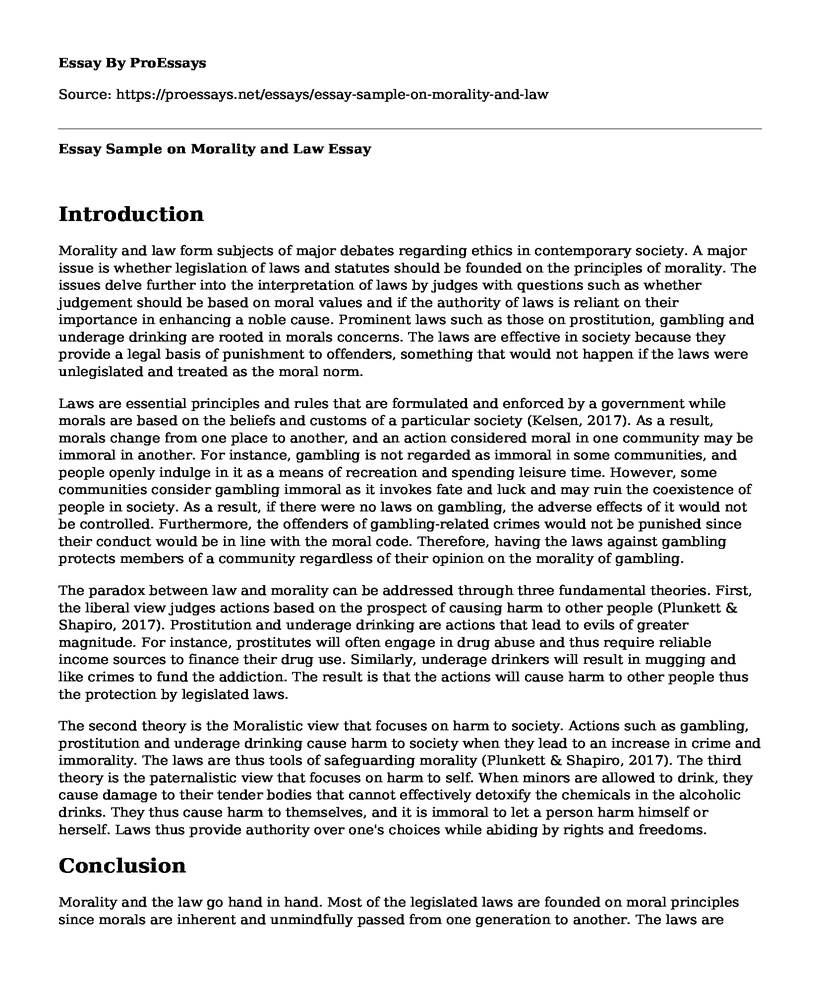Introduction
Morality and law form subjects of major debates regarding ethics in contemporary society. A major issue is whether legislation of laws and statutes should be founded on the principles of morality. The issues delve further into the interpretation of laws by judges with questions such as whether judgement should be based on moral values and if the authority of laws is reliant on their importance in enhancing a noble cause. Prominent laws such as those on prostitution, gambling and underage drinking are rooted in morals concerns. The laws are effective in society because they provide a legal basis of punishment to offenders, something that would not happen if the laws were unlegislated and treated as the moral norm.
Laws are essential principles and rules that are formulated and enforced by a government while morals are based on the beliefs and customs of a particular society (Kelsen, 2017). As a result, morals change from one place to another, and an action considered moral in one community may be immoral in another. For instance, gambling is not regarded as immoral in some communities, and people openly indulge in it as a means of recreation and spending leisure time. However, some communities consider gambling immoral as it invokes fate and luck and may ruin the coexistence of people in society. As a result, if there were no laws on gambling, the adverse effects of it would not be controlled. Furthermore, the offenders of gambling-related crimes would not be punished since their conduct would be in line with the moral code. Therefore, having the laws against gambling protects members of a community regardless of their opinion on the morality of gambling.
The paradox between law and morality can be addressed through three fundamental theories. First, the liberal view judges actions based on the prospect of causing harm to other people (Plunkett & Shapiro, 2017). Prostitution and underage drinking are actions that lead to evils of greater magnitude. For instance, prostitutes will often engage in drug abuse and thus require reliable income sources to finance their drug use. Similarly, underage drinkers will result in mugging and like crimes to fund the addiction. The result is that the actions will cause harm to other people thus the protection by legislated laws.
The second theory is the Moralistic view that focuses on harm to society. Actions such as gambling, prostitution and underage drinking cause harm to society when they lead to an increase in crime and immorality. The laws are thus tools of safeguarding morality (Plunkett & Shapiro, 2017). The third theory is the paternalistic view that focuses on harm to self. When minors are allowed to drink, they cause damage to their tender bodies that cannot effectively detoxify the chemicals in the alcoholic drinks. They thus cause harm to themselves, and it is immoral to let a person harm himself or herself. Laws thus provide authority over one's choices while abiding by rights and freedoms.
Conclusion
Morality and the law go hand in hand. Most of the legislated laws are founded on moral principles since morals are inherent and unmindfully passed from one generation to another. The laws are effective and should be upheld because they provide a legal basis for the punishment of behaviours that infringe on moral principles and have the potential to cause harm.
References
Kelsen, H. (2017). What is the Pure Theory of Law? In Law and Morality (pp. 101-108). Routledge.
Plunkett, D., & Shapiro, S. (2017). Law, Morality, and Everything Else: General Jurisprudence as a Branch of Metanormative Inquiry. Ethics, 128(1), 37-68.
Cite this page
Essay Sample on Morality and Law. (2022, Mar 27). Retrieved from https://proessays.net/essays/essay-sample-on-morality-and-law
If you are the original author of this essay and no longer wish to have it published on the ProEssays website, please click below to request its removal:
- Compare and Contrast Essay on Free Will vs. Determinism
- Ethical and Moral Dilemma of a Defense Lawyer Essay
- Research Paper Action Plan Code of Ethics of the Elementary School
- Story of Evil Criminology Essay Example
- Rodney Alcala - Research Paper
- Mass Shootings: It Happened Again Cartoon Represents the Realities of Growing U.S. Incidences - Essay Sample
- Reevaluating Capital Punishment: Ineffectiveness and Moral Concerns in the Criminal Justice System







